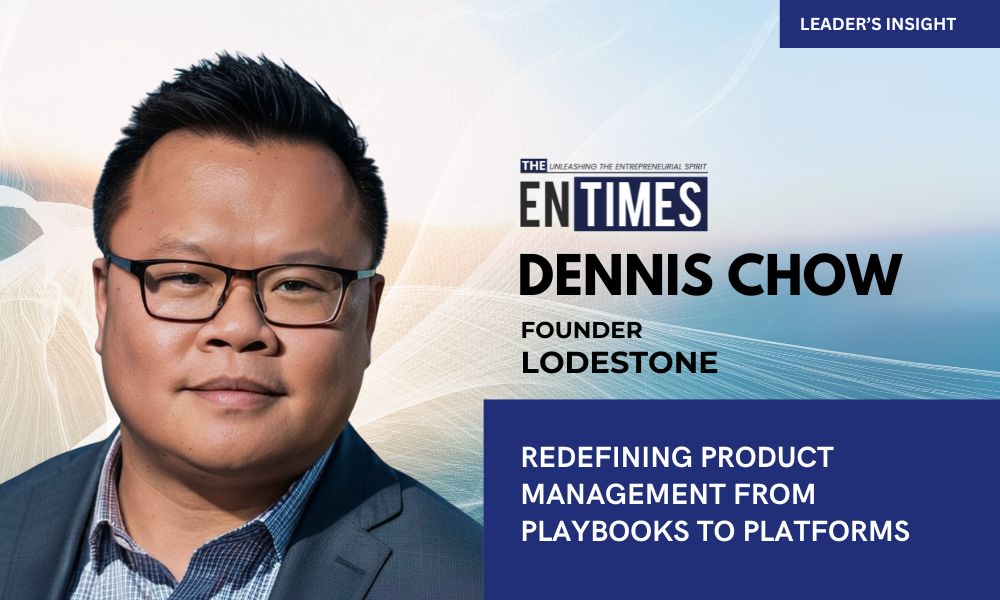Dennis Chow, veteran product leader and founder of Lodestone, has spent over two decades navigating the complexities of product management. From scaling teams at Nexonia,TouchBistro and KEV Group to addressing client requirements, his journey uncovers the recurring challenges product teams face and the innovative solutions he developed to overcome them.
With a philosophy that blends analytical rigor, human-centered strategy, and storytelling, Dennis empowers product managers to make faster, smarter, and more strategic decisions. His story is a compelling blueprint for leadership, mentorship, and innovation in the modern product world.
A Leap From Leadership to Founding Lodestone
After more than two decades in product management, Dennis noticed a pattern that transcended companies and industries: product teams often struggled to convert data, ideas, and plans into actionable strategy. Roadmaps were often lists of features rather than true strategic narratives, leaving teams frustrated and overworked. The pandemic offered a rare pause, giving Dennis the space to reflect.
While exploring LinkedIn, he observed the abundance of playbooks for sales, operations, and revenue but realized no dedicated playbook existed for product management. That gap sparked the idea that eventually became Lodestone. A consulting concept transformed into a software platform when Dennis connected with the right technical partner, setting the foundation for Lodestone’s mission: guiding product teams to make better, faster, and more strategic decisions.
Identifying the Core Problem
Dennis’s approach to problem identification is rooted in practical experience. Having run hundreds of workshops for product managers, he noticed a recurring request: “Isn’t there a tool for this?” Teams spent hours creating roadmaps in Excel and PowerPoint, yet clarity was hard to achieve.
This repeated pain point became Lodestone’s starting point. The platform’s initial module, focused on roadmaps, was designed to transform static spreadsheets into strategic narratives. By framing work in terms of story and strategy, Lodestone allowed PMs to communicate decisions more clearly and act on insights faster.
Scaling Teams, Scaling Insight
Before founding Lodestone, Dennis led the product team at TouchBistro through exponential growth, expanding from just two product managers to a cohesive department of thirty across product, design, and operations. He stepped in as interim CTO, overhauling collaboration between product, design, and engineering, and establishing a squad structure that improved velocity and time-to-market.
Beyond operational achievements, Dennis emphasizes the human side of scaling: providing space for growth, fostering autonomy, and balancing business needs with personal development. He also led a buy/build/partner strategy that contributed to raising over $220 million in late-stage funding, demonstrating the intersection of strategic vision and team empowerment.
Balancing Innovation and Speed
At Lodestone, innovation and operational speed are two sides of the same coin. Dennis maintains a disciplined workflow with a tightly managed backlog, detailed specifications, and a structured release cycle every two to three sprints. Yet curiosity drives innovation: every customer call is catalogued and made searchable, discovery and validation sprints are routine, and one-on-one sessions encourage exploration of new approaches.
This dual focus ensures Lodestone delivers quickly without compromising on creativity or insight, providing product teams the tools to operate efficiently while exploring better solutions.
Strategic Decisions That Shaped Impact
Some of Lodestone’s most transformative moments came from bold roadmap choices. Early on, the team prioritized document generators over building a feature backlog. While the natural progression might have been the backlog, integrating OpenAI’s APIs enabled PMs to generate draft PRDs, opportunity canvases, and user stories in seconds.
Adoption surged as product managers leveraged these tools for rapid drafting of documents that enabled them to focus on iteration rather than struggle with creation. This choice not only validated Lodestone’s time-saving promise but also created immediate demand for a feature backlog, shaping the platform’s trajectory and illustrating the value of leading with innovation that addresses real pain points.
Economics and Philosophy in Product Leadership
Dennis’s academic background in economics and philosophy profoundly influences his approach to product strategy. Economics provides him with analytical rigor to evaluate trade-offs, ROI, and impact, while philosophy equips him to structure arguments, anticipate objections, and persuade effectively.
Product managers are rarely the ones designing, coding, or selling; their job is to chart the next logical step and convince stakeholders to follow. By combining numbers and narrative, Dennis creates strategies that are both analytically sound and compellingly communicated, a balance central to successful product leadership.
Mentorship as a Growth Engine
Developing high-performing product managers is both an art and a science for Dennis. He begins by mapping team members’ strengths, weaknesses, and aspirations, then assigns stretch objectives that push them just beyond comfort zones. Through regular check-ins, Dennis ensures guidance and support while allowing autonomy and ownership. This approach has helped PMs transition into leadership roles, including VP and CPO positions.
Dennis likens mentorship to a decision tree, where each choice opens new branches of opportunity, and guidance enables team members to see possibilities they might otherwise miss.
Leveraging Storytelling for Alignment
Storytelling is central to Dennis’s philosophy, both in Lodestone’s product development and in his broader approach to leadership. Drawing from narrative frameworks, he employs classic narratives such as “what was versus what could be” and “us versus them” to craft stories that clearly demonstrate the contrast between current realities and future possibilities.
Such techniques turn roadmaps and strategy decks into compelling narratives, rallying teams and securing stakeholder buy-in. Storytelling transforms data and decisions into a shared vision, aligning product teams toward common goals.
Advising the Next Generation of Founders
Beyond his own company, Dennis contributes as an advisor at MaRS Discovery District, where he helps founders navigate common challenges: defining precise ideal customer profiles and resisting the temptation to overbuild products. By focusing on solving one problem exceptionally well before expanding, founders can achieve
sustainable growth. Dennis’s guidance emphasizes clarity, focus, and disciplined execution, reflecting the principles he applies across his own teams.
Insights From Competitive Intelligence
Competitive intelligence plays a validating role in Dennis’s strategy but never dictates it. Awareness of competitors’ actions is useful, but Lodestone has always prioritized its customers and long-term vision over reactive decision-making. By grounding strategies in internal insight and market understanding rather than chasing competitors, Dennis ensures that innovation and differentiation remain authentic and impactful.
Recognition and Its Role in Leadership
Receiving the “Technology Executive of the Year” award in 2019 was an acknowledgment Dennis appreciated, but it did not redefine his leadership style. Experience, reflection, and a commitment to learning continue to shape his approach. Recognition is secondary to creating tangible impact for teams, customers, and the broader community, a philosophy that underscores all his professional pursuits.
Conclusion
Dennis Chow’s career is a masterclass in combining strategy, storytelling, and mentorship. From a product executive at industry-defining startups and scaleups, to a founder at Lodestone, he has consistently demonstrated how analytical thinking and human-centered leadership can solve recurring challenges in product management. Lodestone’s success validates his vision of empowering product managers to save time, act strategically, and communicate with clarity.
Dennis’s journey illustrates that true leadership is measured not by accolades but by the impact on teams, products, and communities, offering a roadmap for aspiring product leaders to follow with purpose, curiosity, and precision.


